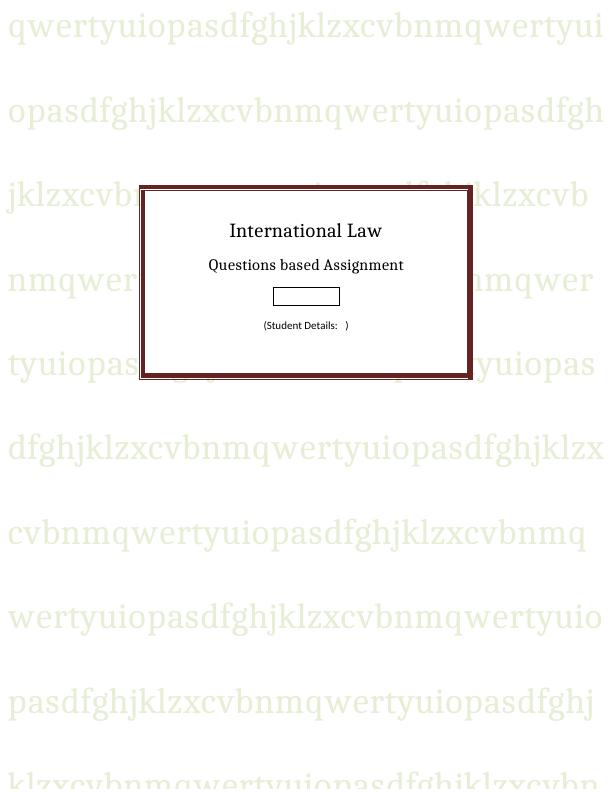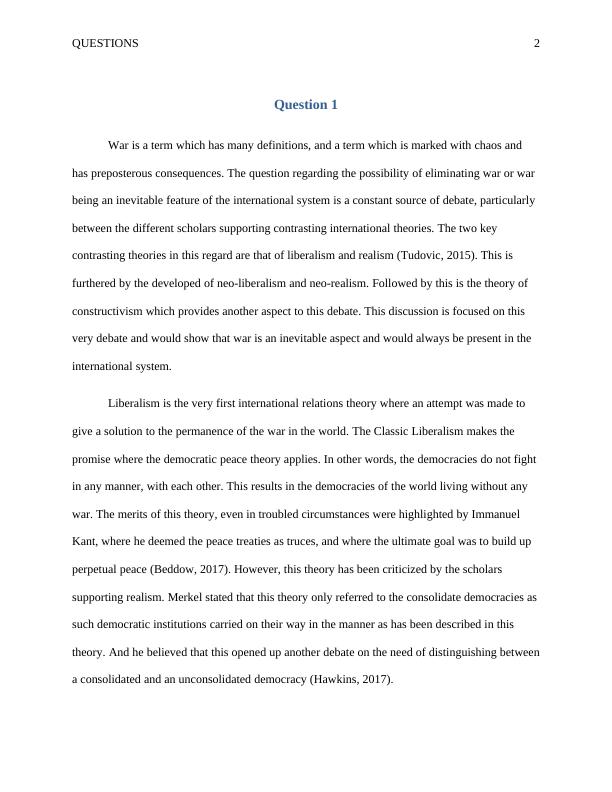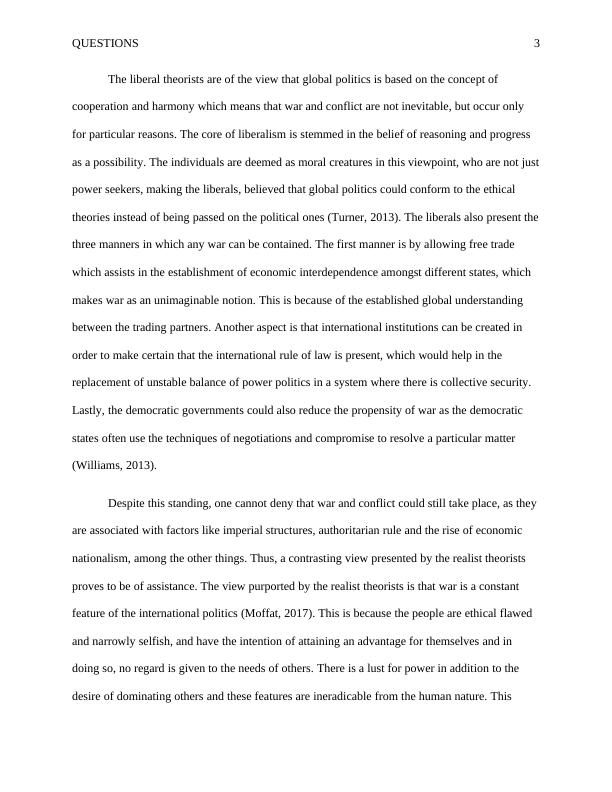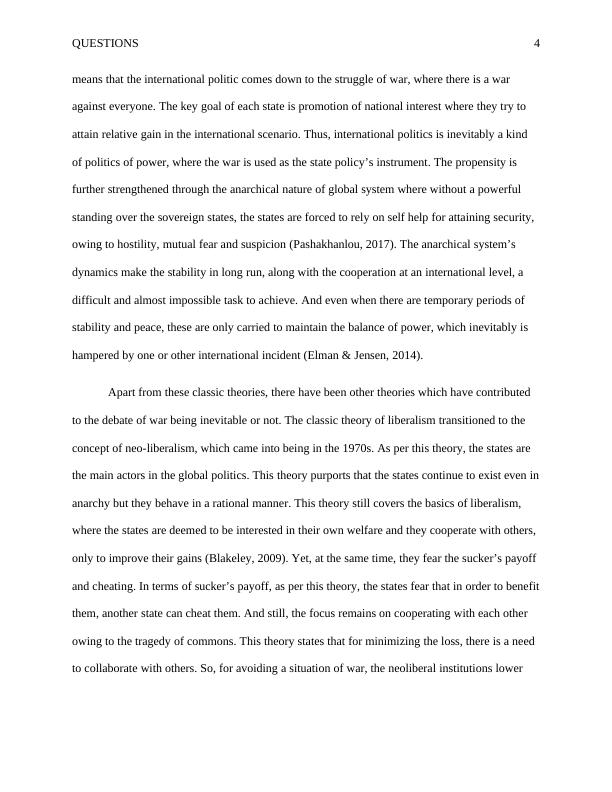Ask a question from expert
International Law Questions based Assignment
13 Pages3436 Words62 Views
Added on 2020-04-21
International Law Questions based Assignment
Added on 2020-04-21
BookmarkShareRelated Documents
qwertyuiopasdfghjklzxcvbnmqwertyuiopasdfghjklzxcvbnmqwertyuiopasdfghjklzxcvbnmqwertyuiopasdfghjklzxcvbnmqwertyuiopasdfghjklzxcvbnmqwertyuiopasdfghjklzxcvbnmqwertyuiopasdfghjklzxcvbnmqwertyuiopasdfghjklzxcvbnmqwertyuiopasdfghjklzxcvbnmqwertyuiopasdfghjklzxcvbnmqwertyuiopasdfghjklzxcvbnmqwertyuiopasdfghjklzxcvbnmqwertyuiopasdfghjklzxcvbnInternational LawQuestions based Assignment(Student Details: )

QUESTIONS 2Question 1War is a term which has many definitions, and a term which is marked with chaos and has preposterous consequences. The question regarding the possibility of eliminating war or war being an inevitable feature of the international system is a constant source of debate, particularly between the different scholars supporting contrasting international theories. The two key contrasting theories in this regard are that of liberalism and realism (Tudovic, 2015). This is furthered by the developed of neo-liberalism and neo-realism. Followed by this is the theory of constructivism which provides another aspect to this debate. This discussion is focused on this very debate and would show that war is an inevitable aspect and would always be present in the international system. Liberalism is the very first international relations theory where an attempt was made to give a solution to the permanence of the war in the world. The Classic Liberalism makes the promise where the democratic peace theory applies. In other words, the democracies do not fight in any manner, with each other. This results in the democracies of the world living without any war. The merits of this theory, even in troubled circumstances were highlighted by Immanuel Kant, where he deemed the peace treaties as truces, and where the ultimate goal was to build up perpetual peace (Beddow, 2017). However, this theory has been criticized by the scholars supporting realism. Merkel stated that this theory only referred to the consolidate democracies assuch democratic institutions carried on their way in the manner as has been described in this theory. And he believed that this opened up another debate on the need of distinguishing betweena consolidated and an unconsolidated democracy (Hawkins, 2017).

QUESTIONS 3The liberal theorists are of the view that global politics is based on the concept of cooperation and harmony which means that war and conflict are not inevitable, but occur only for particular reasons. The core of liberalism is stemmed in the belief of reasoning and progress as a possibility. The individuals are deemed as moral creatures in this viewpoint, who are not justpower seekers, making the liberals, believed that global politics could conform to the ethical theories instead of being passed on the political ones (Turner, 2013). The liberals also present thethree manners in which any war can be contained. The first manner is by allowing free trade which assists in the establishment of economic interdependence amongst different states, which makes war as an unimaginable notion. This is because of the established global understanding between the trading partners. Another aspect is that international institutions can be created in order to make certain that the international rule of law is present, which would help in the replacement of unstable balance of power politics in a system where there is collective security. Lastly, the democratic governments could also reduce the propensity of war as the democratic states often use the techniques of negotiations and compromise to resolve a particular matter (Williams, 2013). Despite this standing, one cannot deny that war and conflict could still take place, as they are associated with factors like imperial structures, authoritarian rule and the rise of economic nationalism, among the other things. Thus, a contrasting view presented by the realist theorists proves to be of assistance. The view purported by the realist theorists is that war is a constant feature of the international politics (Moffat, 2017). This is because the people are ethical flawed and narrowly selfish, and have the intention of attaining an advantage for themselves and in doing so, no regard is given to the needs of others. There is a lust for power in addition to the desire of dominating others and these features are ineradicable from the human nature. This

QUESTIONS 4means that the international politic comes down to the struggle of war, where there is a war against everyone. The key goal of each state is promotion of national interest where they try to attain relative gain in the international scenario. Thus, international politics is inevitably a kind of politics of power, where the war is used as the state policy’s instrument. The propensity is further strengthened through the anarchical nature of global system where without a powerful standing over the sovereign states, the states are forced to rely on self help for attaining security, owing to hostility, mutual fear and suspicion (Pashakhanlou, 2017). The anarchical system’s dynamics make the stability in long run, along with the cooperation at an international level, a difficult and almost impossible task to achieve. And even when there are temporary periods of stability and peace, these are only carried to maintain the balance of power, which inevitably is hampered by one or other international incident (Elman & Jensen, 2014). Apart from these classic theories, there have been other theories which have contributed to the debate of war being inevitable or not. The classic theory of liberalism transitioned to the concept of neo-liberalism, which came into being in the 1970s. As per this theory, the states are the main actors in the global politics. This theory purports that the states continue to exist even inanarchy but they behave in a rational manner. This theory still covers the basics of liberalism, where the states are deemed to be interested in their own welfare and they cooperate with others, only to improve their gains (Blakeley, 2009). Yet, at the same time, they fear the sucker’s payoff and cheating. In terms of sucker’s payoff, as per this theory, the states fear that in order to benefitthem, another state can cheat them. And still, the focus remains on cooperating with each other owing to the tragedy of commons. This theory states that for minimizing the loss, there is a need to collaborate with others. So, for avoiding a situation of war, the neoliberal institutions lower

End of preview
Want to access all the pages? Upload your documents or become a member.
Related Documents
Economics of Regional Trade: IPE Theories, Improving Wages, and Globalizationlg...
|14
|3567
|311
International Relations and Conflict Resolutionlg...
|10
|2609
|416
THEORICAL PERSPECTIVES OF GLOBAL GOVERNANCE.lg...
|6
|1546
|75
Future Of The Liberal International Orderlg...
|6
|1455
|46
International Relations - China and the United Stateslg...
|6
|1518
|107
Overview of Theoretical Points of View in Political Sciencelg...
|6
|1137
|326